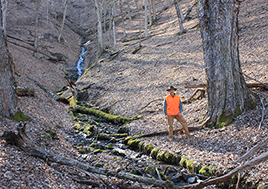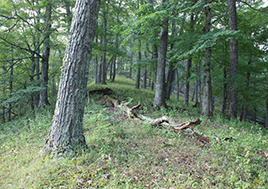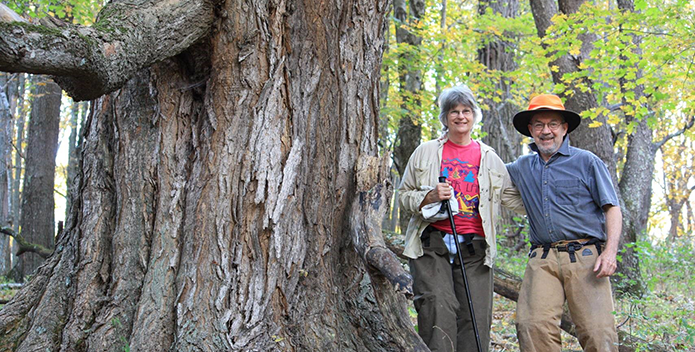My wife and I have always loved the natural world, and as we approached retirement we looked for a natural place to retire—a wooded property with a mature forest. After several years of searching, we found our place in Little Valley, in Bath County, Virginia. We will never forget the first time we walked up the ridge behind where our home now sits and looked down into Cathedral Hollow. The view into this ancient forest took our breath away. After many years of hiking through forests, we found this one to be exceptionally beautiful. We had a home built here six years ago, and have enjoyed living here, surrounded by nature in all its glory.

The path of the Atlantic Coast Pipeline will cut a 150 foot wide scar through this property and will endanger streams like this one, as well as ground water.
Bill Limpert.
Little Valley is remote and quiet, with great air quality, and pure mountain streams supporting native brook trout. We have an expansive view over several mountain ridges, and a beautiful view across Cathedral Hollow to Miracle Ridge, a steep narrow ridge near our home, also covered with old growth forest. The Virginia Department of Conservation and Recreation has come to our property and determined that a large part of it is extremely rare, never been cut, virgin forest. They named our property and adjacent properties the Little Valley Slope Conservation Area.
Our Garden of Eden is now threatened by the Atlantic Coast Pipeline (ACP). It would cut a 125-150 foot wide scar through over 3,000 feet of our property on Miracle Ridge. It would cut down over 300 hundred old growth trees averaging six feet in circumference, and hundreds of years old. It would blast Miracle Ridge 30 feet deep to place the pipeline, and leave a permanent pile of rubble.
Besides the loss of scenic beauty, the loss of ancient trees, the safety concerns, and the loss of property value, the impact that this pipeline would have on our waters is paramount. The pipeline would significantly impact both surface waters and groundwater. We live in karst terrain where sinkholes, sinking streams, and springs create a constant intermingling of surface and groundwaters. What falls on the ground likely enters our groundwater. All of us in Little Valley, and many others in the path of the ACP live in karst terrain, and rely solely on that groundwater feeding our wells and springs for our drinking water. No public water is available.

These trees on Miracle Ridge are in the proposed path of the Atlantic Coast Pipeline.
Bill Limpert.
Our drinking water is threatened by fuel spills, industrial pollutants, sediment, and blasting agents during construction, and by herbicides applied during pipeline maintenance. This threat extends well beyond the immediate vicinity of the pipeline, since pollutants can travel many miles in karst terrain. Blasting can also collapse the fragile limestone underground channels that bring water to our wells and springs, and diminish or completely cut off our water.
Surface waters would be impacted by the same pollutants, increased flooding, and thermal pollution as well. Sediment smothers aquatic life, and fills in receiving stream channels. Industrial pollutants are toxic to aquatic life. Forest clearcutting, including 6 square miles in Virginia alone, would increase stormwater runoff and result in flooding and erosion to receiving streams. This runoff would be unnaturally heated by the loss of forest canopy, and would cause thermal pollution to receiving streams, diminishing or extinguishing cold water species, like native brook trout.
The pipeline would also cross hundreds of streams, rivers, wetlands, and even drinking water reservoirs, further diminishing water quality along a 600-mile path of pollution.
Water is life, and clean, abundant water is our right. This unnecessary pipeline severely threatens our waters, and in turn, threatens all of us.
Bill Limpert
Issues in this Post
Advocacy Atlantic Coast Natural Gas Pipeline Forest Loss Water Quality CBF in Virginia



